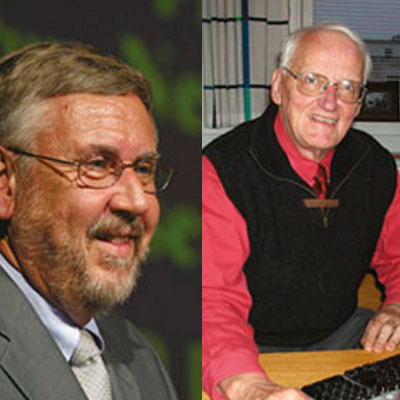heading
2004: Sven Erik Jørgensen, Denmark and William J. Mitsch, USA
Professors Jørgensen and Mitsch's theoretical and applied work on lake and wetland ecosystems, management of lake and wetland water quality, and lake, river and wetland conservation, restoration and usage has been acknowledged and implemented in both developing and developed countries.

Sven Erik Jørgensen is a professor of environmental chemistry at the Danish University of Pharmaceutical Sciences in Copenhagen.
William J. Mitsch is a professor of natural resources and environmental science and director of the Olentangy River Wetland Research Park at The Ohio State University in Columbus.
Lakes and wetlands have inestimable value and are important and often easily available water resources. Lakes supply drinking water, hydropower, food, irrigation and recreation, yet they are threatened by pollution and excessive water withdrawal. Wetlands are cradles of vital biological diversity and provide the water and primary productivity upon which numerous species of plants and animals depend for survival. But they are threatened by drainage for use in agriculture and other purposes. Preservation of lakes and wetlands is a life necessity for people in many regions of the world, given their cultural, ecological and socio-economic value.
Professor Jørgensen’s unique ecosystem models encompass entire lake and wetlands systems and the physical, biological and chemical interactions taking place within them.
These kinds of system models provide managers and planners with concrete tools to address problems and implement solutions. As an example, he and his co-workers developed modelling software for the United Nations Environment Programme to support planning and decision making for the management of lakes and wetlands in developing countries and countries in transition. Today, more and more freshwater bodies have become polluted by nutrients originating from agricultural, domestic and industrial sources, a situation which causes them to become eutrophic (where excessive algal growth results in severe changes of water quality and the ecology). The software developed by Professor Jørgensen provides an easy-to-use tool that allows for a better understanding of eutrophication processes.
Professor Mitsch was the inspiration behind the Olentangy River Wetland Research Park at The Ohio State University, a world-class wetland research and education facility.
There, among other focus areas, research on the ecological restoration of the Mississippi-Ohio-Missouri Basin is being spearheaded. To help reduce coastal pollution in the northern Gulf of Mexico, the ultimate depository of the Mississippi, he has also taken the role as leader in the debates, studies and resolutions dealing with coastal wetland losses in the US state of Louisiana. He has also shown that constructed wetlands can be engineered for use as buffering and purification systems, as has Professor Jørgensen, who has been responsible for a project in Tanzania to develop better knowledge of such systems. In practical terms, artificial wetlands can be ideal for use as an inexpensive, final stage in the domestic wastewater treatment process.
As educators, authors and speakers, Jørgensen and Mitsch have directly or indirectly influenced and inspired many of the scientists and environmental engineers responsible for lake and wetland protection in all parts of the world. Professor Jørgensen has led many courses in developing countries and advises agencies and authorities also on the use and protection of wetlands. Professor Mitsch founded the leading publication in the field, “Ecological Engineering,” and co-authored the university standard textbook “Wetlands,” which today influences future water professionals around the world.
The Laureates have also always emphasised the importance of assisting countries and regions which have differing states of technical and scientific development than the Western nations.